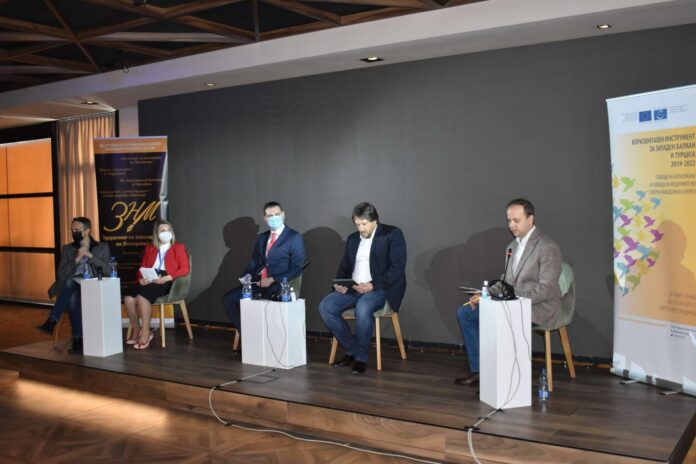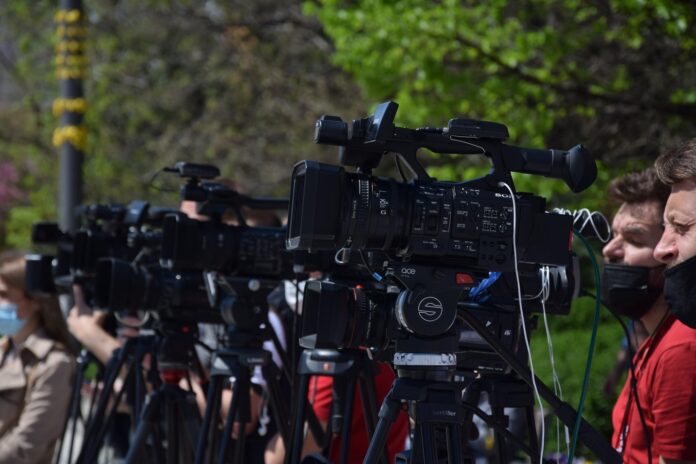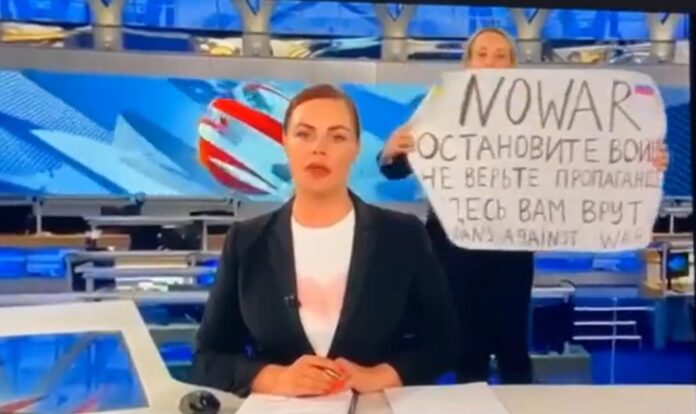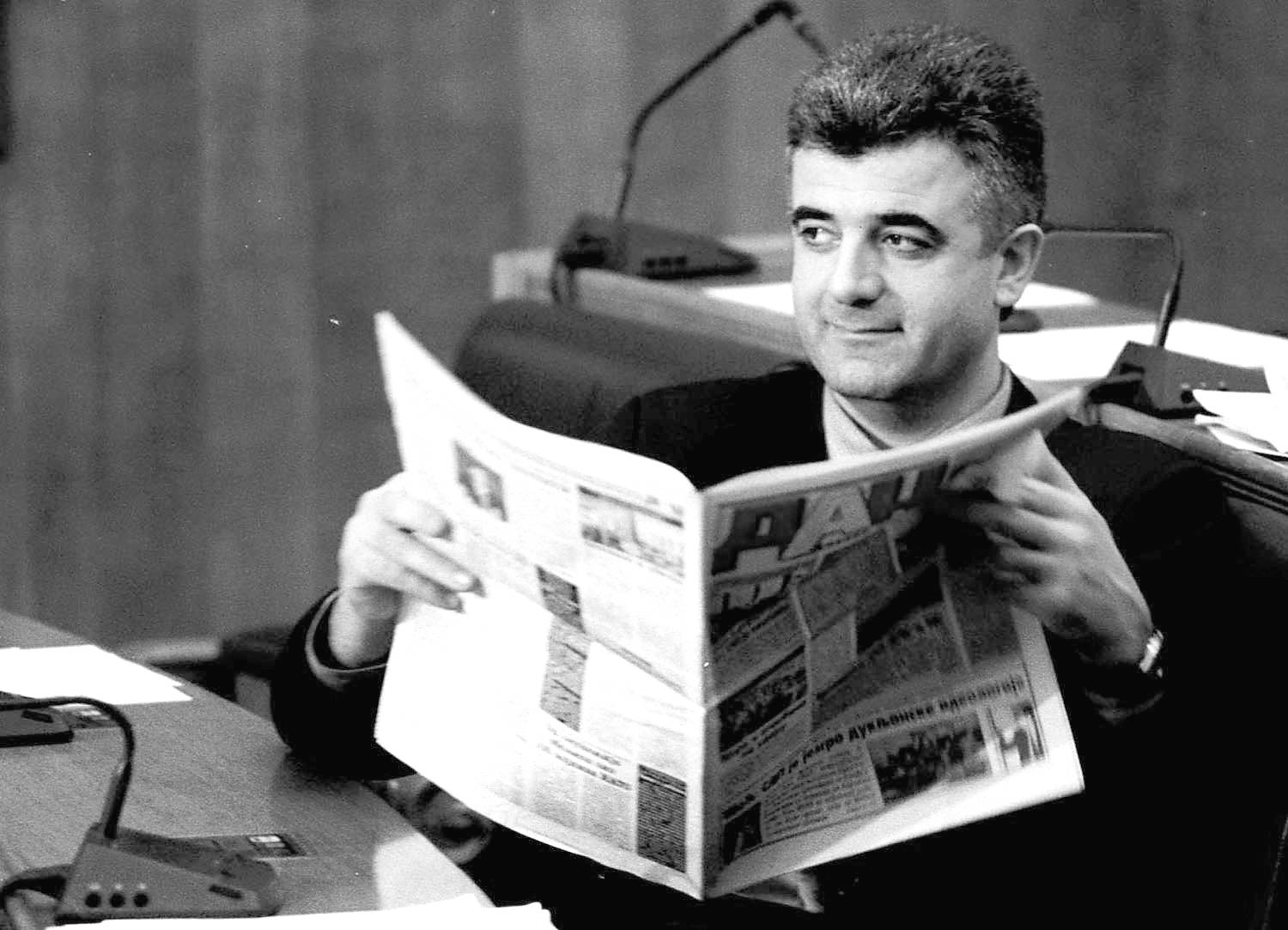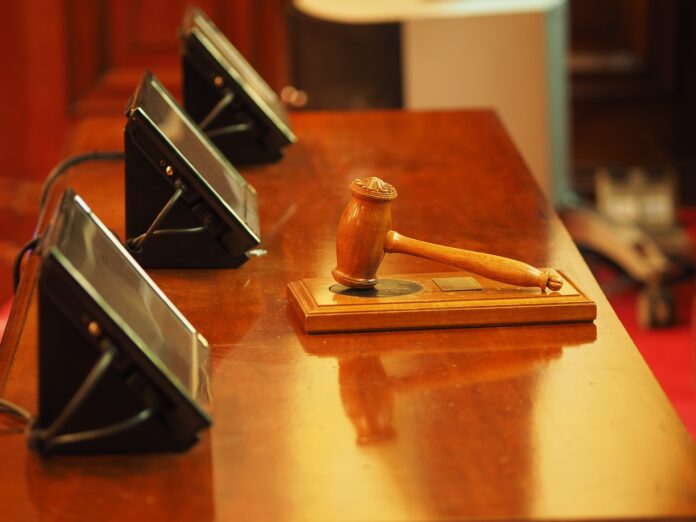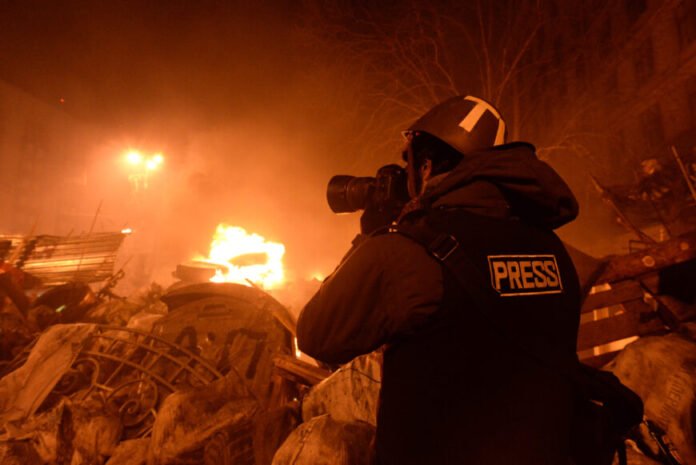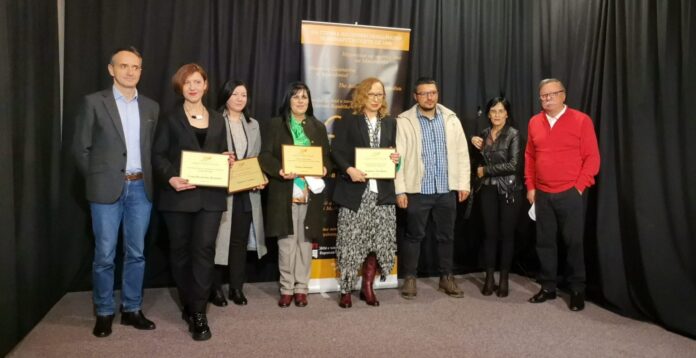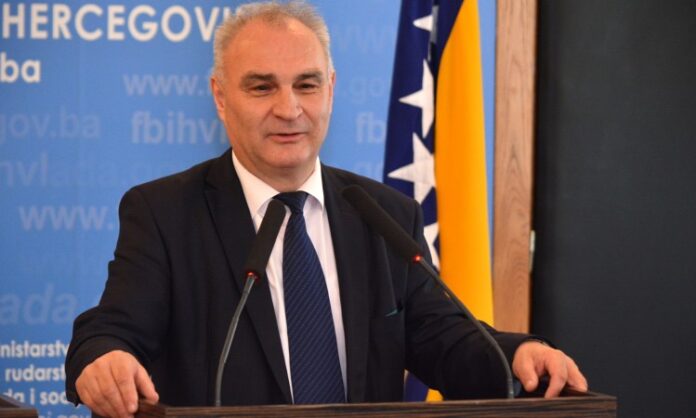A man with a large tattoo on his chest of Bosnian Serb wartime commander Ratko Mladic, a convicted war criminal, stands near a protest against Russia’s invasion of Ukraine on March 16.
No one is comparing Miljko Stojanovic to increasingly at-risk foreign journalists covering Russia’s invasion from the ground in Ukraine.
But even as a local correspondent for the Danas daily in eastern Serbia, he has faced death threats and other online abuse from a mostly anonymous digital mob since profiling a Ukrainian in his early 30s who found temporary shelter in Serbia after fleeing Lviv, in western Ukraine.
Stojanovic said the threats left him unwell enough to seek emergency medical care himself and have him worried for the safety of his family as well as for the war refugee in his story.
“I feel terrible,” he told RFE/RL’s Balkan Service from Zajecar, where he is a local correspondent for Danas. “What strikes me most is that this guy traveled 1,000 kilometers, escaped from the hell of war, and now he feels insulted and attacked here.”
Local police responded quickly to Stojanovic’s complaint, arresting an unnamed individual suspected of endangering public safety.
But his and other cases — against a backdrop of rallies in Belgrade to support Serbs’ Russian “brothers” — hint at the reach in the Balkans of Kremlin talking points and the perils of even appearing to blame Moscow for its unprovoked attack on Ukraine.
Stojanovic, who has expressed opposition to the war in Ukraine, said he was threatened “that something would happen to me if I accidentally met someone who was threatening me on the street in Zajecar,” a city of around 60,000 people.
Stojanovic said not all the insults and online attacks are anonymous; some include the names and surnames of the people who posted them.
Some of them accuse the young Ukrainian of opposing Orthodox Christianity and supporting Kosovo, a former Serbian province whose 2008 declaration of sovereignty is supported by more than 100 countries but still fiercely opposed by Belgrade and Moscow, among others.
Stojanovic also said some insults against the Ukrainian include suggestions that he is “a Nazi and not welcome in Serbia, as Ukraine is a fascist country.”
Such language echoes a long-standing and misleading characterization of the pro-Western governments that emerged in Ukraine after a pro-Moscow president was ousted by popular unrest in 2013-14.
Many Western analysts have noted the cruel irony of Russian President Vladimir Putin’s stated justification of the invasion as the “de-Nazification” of a country led by a democratically elected president of Jewish descent, Volodymyr Zelenskiy.
A number of European states and their populations have mobilized to help accommodate many of the 3 million Ukrainian refugees who have already left their homeland since the Russian air, sea, and ground offensive began on February 24.
Serbia took in slightly more than 1,000 Ukrainian refugees in the first two weeks of the war, according to its Commissariat for Refugees and Migration of the Republic, a small fraction of the 6,000 or so places it has available, according to a leading NGO in the sector.
Serbian President Aleksandar Vucic’s close diplomatic, trade, and defense ties to Russia have long frustrated EU leaders already reluctant to enlarge the bloc to include Serbia and a handful of its post-Yugoslav neighbors.
He and other Serbian officials have sent mixed messages about the Ukraine war in the weeks ahead of crucial national and local elections on April 3.
Vucic has condemned the attack and reiterated Ukrainian “territorial integrity” but vowed that his overwhelmingly Orthodox country of around 7 million people wouldn’t join European sanctions targeting Russia. Belgrade joined a UN vote to condemn the Russian invasion.
This week, Belgrade buckled slightly when it confirmed it would join the European Union in sanctions targeting exiled former Ukrainian President Viktor Yanukovych, a Moscow ally.
But the speaker of the Serbian parliament, Ivica Dacic, pledged to Russian Ambassador Aleksandr Bocan-Kharcenko on March 15 that “Serbia will be guided by its national interests, and they imply that Serbia will not impose sanctions on Russia.”
A day earlier, the head of the diplomatic service of the EU’s foreign and defense structure known as the European External Action Service, Michael Siebert, had warned bluntly that “we are making it clear to Serbia what the price will be if the country is on the wrong side of the conflict.”
After EU and other European countries closed their airspace to Russian airliners, Air Serbia increased its routes to Russia. After ongoing pressure from the EU, the Serbian airliner has only reluctantly reduced its increased routes between Belgrade and Russia.
Thousands of Serbians have joined multiple demonstrations in the capital in support of Putin and Russia over the past three weeks, frequently appealing to Russians as “brothers.”
Meanwhile, the head of Serbia’s Independent Association of Journalists, Zeljko Bodrozic, has spoken of Stojanovic’s case and other “inconveniences” for local reporters stemming from their coverage of the conflict. He said that, unlike Stojanovic’s incident in Zajecar, most do not rise to the level of a threat.
Bodrozic said the association had options at its disposal to help journalists, including through a joint working group with relevant state institutions established six years ago, publicly calling out such behavior, or even turning to the Council of Europe.
He said he didn’t expect significant action in most cases, although “the state could easily react if the police and prosecutor’s office work independently.”
“However, in Serbia, it often comes down to the fact that the police and the prosecutor’s office have to get a wink from the authorities in order to deal more seriously with a case,” Bodrozic said.
Another journalist who has spoken publicly of threats he has received via social networks is Stevan Dojcinovic, editor of the respected Serbian investigative portal KRIK.
Dojcinovic said it was enough for someone on Twitter to condemn “Putin’s destruction of Ukraine or criticize one of his puppets” to become a victim of “cyberbullying.”
He blamed individuals he suggested were loyal to the ruling Serbian Progressive Party (SNS), Putin, and the Russian war effort’s supporters, who have adopted a “Z” in response to markings on Russian military equipment in Ukraine.
“The army of Serbian Zputin bots is ready to [try to] seduce you,” Dojcinovic tweeted. “SNS bots are funny this way.”
Written by senior correspondent Andy Heil in Prague based on reporting in Belgrade by Sonja Gocanin.
Source: Radio Free Europe Radio Liberty



